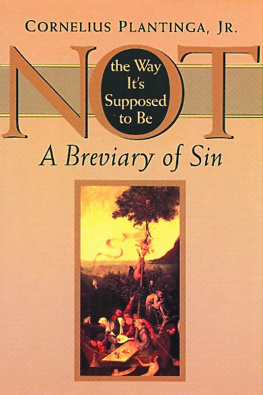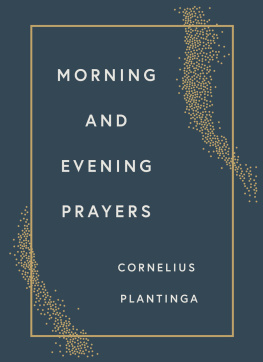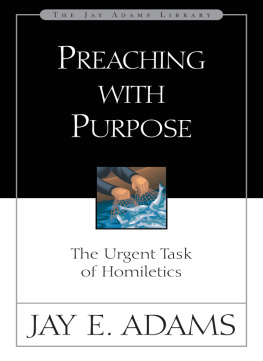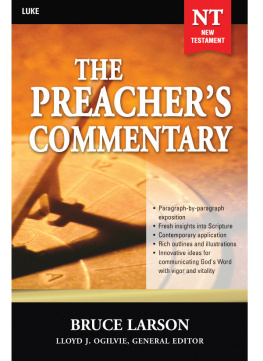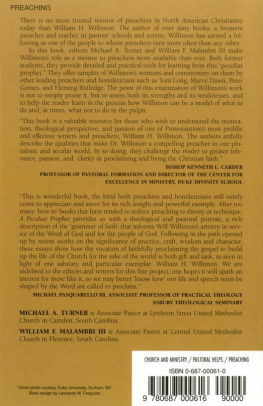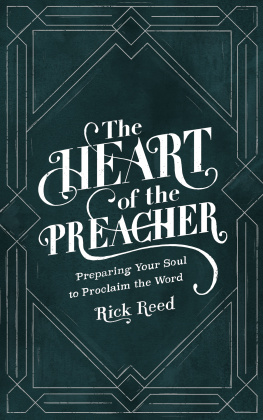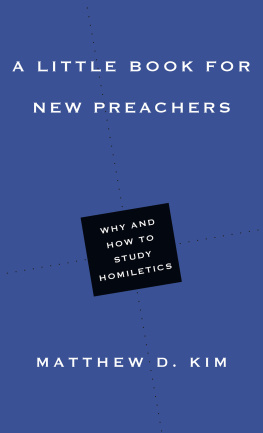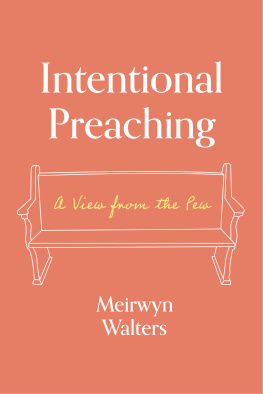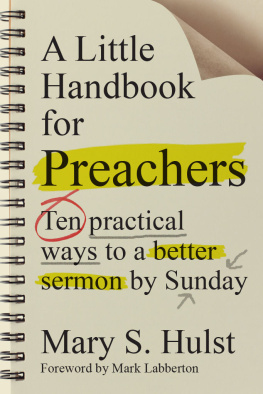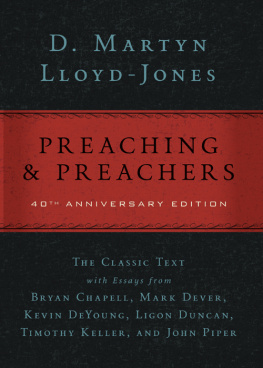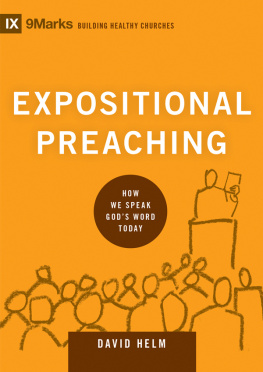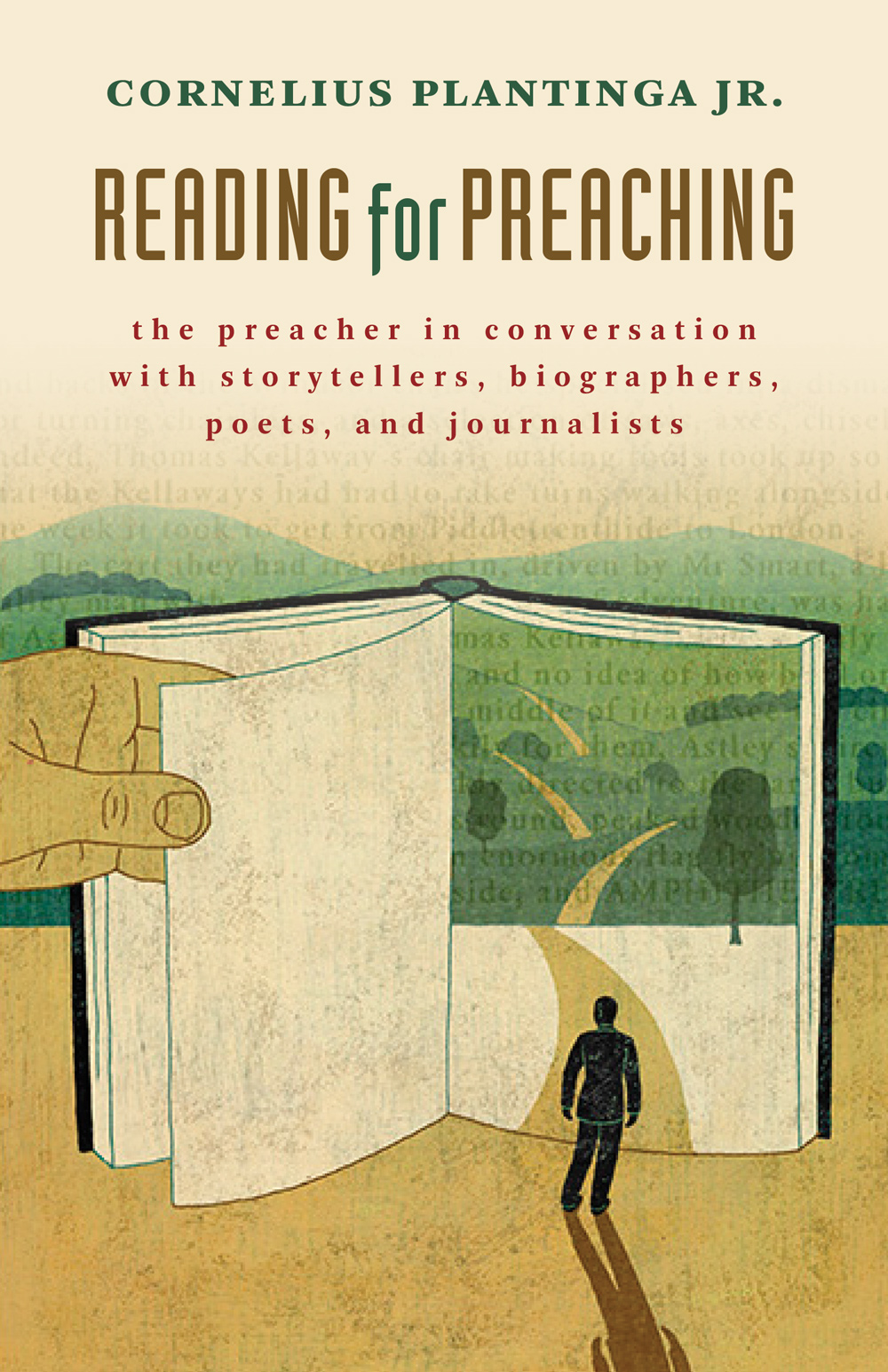Contents
Lets say that preaching is the presentation of Gods Word at a particular time to particular people by someone the church authorizes to do it. Gods Word in a sermon addresses people at many different levels and in many different times and seasons. But in every season Christian preaching centers where Christians think the Bible centers, namely on the reconciling work of Jesus Christ our Lord, especially through his death and resurrection.
Important questions cluster here including a central one: Does a Christian minister preach a text or preach the gospel? Suppose a text hes considering doesnt seem initially to have much gospel in it. Its a warning about what God will do to the wicked. Or its a genealogy that seemingly ends in a historical cul-de-sac. Its a zoological tour in Job or its a ripe old piece of wisdom: Train up a child in the way he should go, and when he is old he will not depart from it. That is the KJV of Proverbs 22:6 and for many generations of English-speaking believers it was a charter for parental discipline.
Preach a text or preach the gospel? Preach a sermon that could as easily have been preached in a synagogue? Or find the gospel somewhere in Proverbs 22:6, even though it doesnt seem to be there? Or skip Proverbs 22:6? Or convert to Marcionism and skip the Old Testament altogether? Or what?
Here, of course, is where the Revised Common Lectionary can help the preacher in lots of instances, though in the case of Proverbs 22:6 the Lectionary detours right around it, listing only verses 1-2 and 8-9 for Proper 18 in Year B. So the preacher who wants to address this famous text might have to find his own gospel and epistle pairings for it. And he might end up pondering with his congregation that kindness and laughter in a home are generationally as contagious as abuse, and that they provide acoustics in which the gospel of grace will sound plausible and resonant, even to the children of preachers.
Preach a text or preach the gospel? Either way, Im assuming that preachers are addressed by Gods Word just as much as the rest of us and that the power of a good sermon derives in part from its authenticity in this way. The preacher is not just a speaker of Gods Word, but also a hearer, and a hearer before he is a speaker. Thats why we can sometimes detect a sense of anticipation in our preacher as he reads Scripture in preparation for the morning sermon. He has a good idea of what God might be about to say.
Authentic preaching is personally committed preaching. The churchs pulpit is never disinterested because the preacher, like the rest of us, has a stake in the truth of the gospel. In fact, the sermons message ultimately comes only through, and not from, the preacher and it centers on the same God who sends it. For we do not proclaim ourselves, as St. Paul put it; we proclaim Jesus Christ as Lord (2 Cor. 4:5).
Jesus Christ is the center, but there are lots of routes to the center in a good program of preaching, and they depend naturally on the text of the day and especially on what the text does.
Doing and Saying
Classically speaking, to preach a text is to do in other words what the text does. So, depending on the text, the preacher might inform people one Sunday and challenge them the next. He might praise, or lament, or reassure, and if he preaches the gospel he often reassures. If he has hold of a wise text he might counsel us from the pulpit. A faithful preacher will sometimes provoke us if his text is provocative enough. If his text is in the interrogative mood, maybe our preacher will follow suit by turning a big part of the sermon into a repeated question. Who proved to be neighbor to this man? Lord, why are you so far away? Are you the one who is to come, or are we to wait for another?
In any case, the preachers job is not just to repeat a text, but also to outfit it for the hearing of a congregation. The preacher not only does in other words what the text does. He also says in other words what the text says, dressing it up or down, shaping and coloring and amplifying it in such a way that when people hear the preached text they hear Gods word to them.
Here the preachers use of illustrative material comes into play and here is the most obvious place where a congregation meets the preachers conquests in the field of reading. Whether the preacher quotes writers, paraphrases them, summarizes them, or merely alludes to them, this is how Flannery OConner shows up in a Sunday sermon, or William Manchester, the great biographer of Winston Churchill, or Jane Kenyon, a poet of heartbreaking poignancy, or a Pulitzer Prizewinning newspaper series by Clifford J. Levy and Ellen Barry on the impenetrable corruption of Russian public life and the violent suppression of journalists who report it.
Pretty Sermons?
Almost from the start you might wonder whether we want preachers to be in conversation with the likes of poets and storytellers. Wont this make preachers sound too lush for ordinary people? Preachers start conversing with poets and maybe lose their common touch. Their sermons start filling with allusions to literature in the manner, lets say, of some of the American pulpit giants of the 1930s and 1940s. One of them, the New York preacher Paul Scherer would begin a sermon like this: Synge once said, with cutting cynicism, that Life is a table-dhote in a rather dirty restaurant, with Time changing the plates before you have had enough to eat.
But who is Synge? Scherer assumed people knew the Irish playwright and poet John Millington Synge and that it was enough to refer to Synge by last name alone. In the same sermon Scherer refers to Mr. Dreiser and Mr. Mencken and Mr. Shaw, assuming that these, too, are household names.
If preachers converse with storytellers and poets wont we get literary sermons that assume congregational knowledge of such literary types as Irish poets and playwrights? And once our preacher starts conversing with poets, what stops him from quoting them? What if our preacher quotes from the The Rubaiyat of Omar Khayyam?
Ah Love! Could you and I with fate conspire
To grasp this sorry state of things entire,
Would not we shatter it to bits and then
Remould it nearer to the hearts desire.
Before he started conversing with Khayyam, our plain-spoken preacher would say to us, Wouldnt you like to make life go the way you want? Now he says, Ah Love! Could you and I with fate conspire.... Once upon a time our preacher would say that the women came to Jesus tomb early in the morning. But now he says that the women came to the tomb just as the dawn was blushing pink behind the hills of Moab. Hes been reading poetry and the sermons of Peter Marshall and they have taken him out where the rest of us do not go.
I believe our enthusiasm for his journey would be mild.
So let me say at the outset that in recommending a program of general reading for preachers I will not be asking for a recrudescence of what Reinhold Niebuhr called pretty sermons. Niebuhr appears to have had in mind not just poetry-laden sermons, or florid sermons, but any sermons of highly refined rhetoric. Niebuhr said he wanted to keep his sermons rough, instead, just to escape the temptation of degenerating into an elocutionist. Writing in his diary in Detroit, Niebuhr recorded some of the hard edges of the labor and racial issues he saw every day. No wonder he had little use for high rhetorical art in the pulpit. It must have seemed to him wholly irrelevant to his context.
I take Niebuhrs point and am grateful for it. This should not, in my judgment, silence preachers who sometimes quote fiction or who can turn phrases of their own when necessary. Everything depends on whether the quotations and phrases serve to make the gospel of grace sound more urgently alive or whether they serve merely to make the sermon more aesthetically pleasing. When the sermon is over, does the preacher want hearers to say Thanks be to God! or How lovely that was, really?


